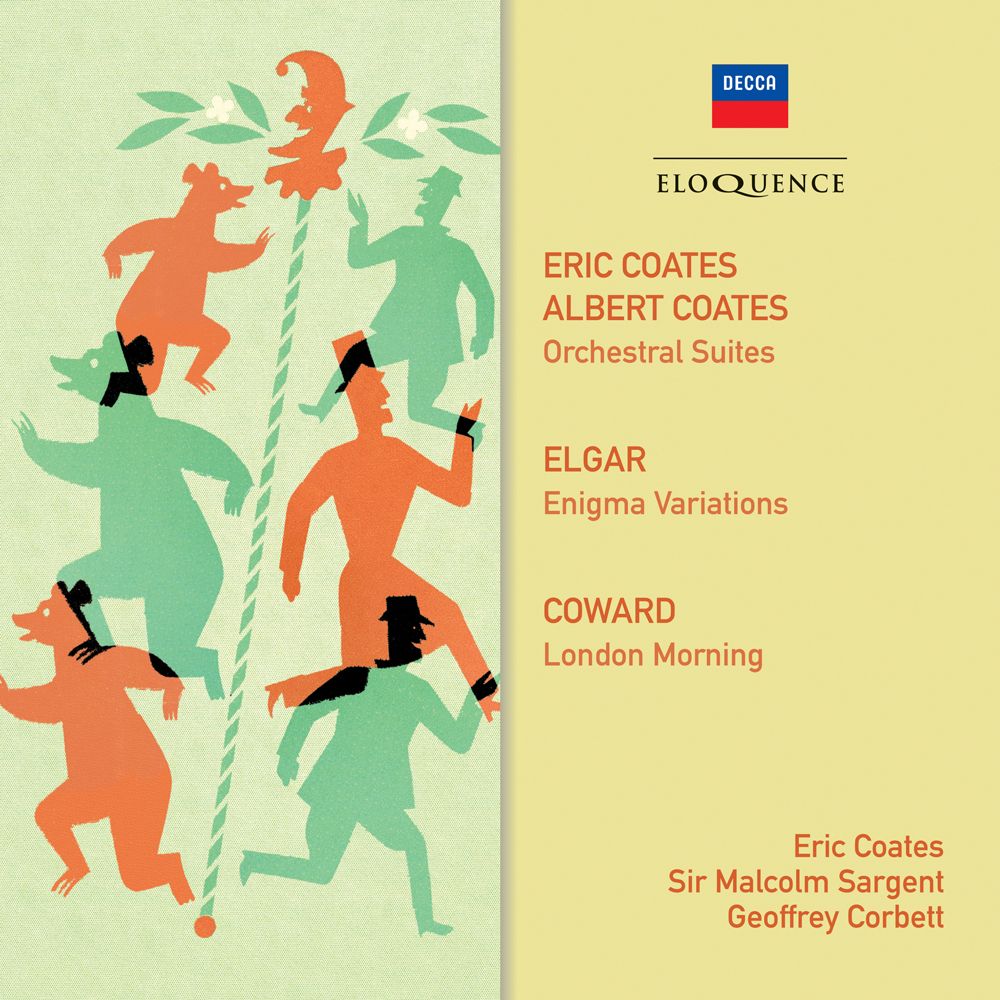Four 1950s Decca records of popular English music, newly remastered and issued complete for the first time on CD.
Better than anyone else, Eric Coates and Sir Noël Coward captured the moods of middle-class, mid-century England at its most optimistic – and in other ways most nostalgic, comforting their audiences and distracting them from their troubles with music as changeable as the weather if orchestrated always on the sunny side. The revival of interest in British light music makes this collection all the more appealing, featuring first recordings of three extended orchestral suites by Coates (recorded 1949-1954) and Coward’s London Morning ballet (1959, still in mono).
The Three Bears is a brief orchestral fantasy on the tale of Goldilocks, illustrated by Coates with a Straussian pictorial relish. The Three Men captures the characters of a trio of English archetypes, in the country, in the city and at sea and The Three Elizabeths present a gallery of royal portraits, unified by a motto theme made famous as the signature tune to the BBC’s film adaptation of The Forsyte Saga. Perhaps his most developed score, The Four Centuries crosses the ages from seventeenth-century pageantry, through the age of the waltz to the hectic world of big-band jazz.
As a former professional violist working under Sir Henry Wood and Sir Thomas Beecham, Coates knew how to tell a story through notes with the fewest notes and the most character. Coward’s success was also built on economy of means, with words as well as notes. Orchestrated by Gordon Jacob, his score for London Morning deftly sketches one scene after another: a suburban family, a girl teasing a sentry and a bobby on the beat, all to the familiar accompaniment of rain and bells.
As a conductor rather than composer, Sir Malcolm Sargent embodied English music-making of the 1950s no less than Coward or Coates. This collection is completed with a new remastering of his 1953 Decca album, pairing Elgar’s Enigma Variations with a suite of theatrical music by Purcell as arranged by the conductor Albert Coates (no relation of Eric).
CD 1
ERIC COATES (1881–1957)
The Three Elizabeths – Suite
Four Centuries – Suite
The Three Bears – A Phantasy
The Dance of the Orange Blossoms (The Jester at the Wedding)
The Three Men – Suite
New Symphony Orchestra of London
Eric Coates
CD 2
ALBERT COATES
Suite from the Dramatic Music of Henry Purcell
SIR EDWARD ELGAR (1857–1934)
Variations on an Original Theme, Op. 36 ‘Enigma’
London Symphony Orchestra
Sir Malcolm Sargent
SIR NOËL COWARD (1899–1973)
London Morning
Orchestrated by Gordon Jacob
London Philharmonic Orchestra
Geoffrey Corbett
FIRST CD RELEASE ON DECCA
Recording Producers: unknown (Eric Coates); John Culshaw (Albert Coates, Elgar); Michael Bremner (Coward)
Balance Engineers: unknown (Eric Coates); Kenneth Wilkinson (Albert Coates, Elgar); Arthur Bannister (Coward)
Recording Locations: Kingsway Hall, London, UK, 3 May 1949 (Eric Coates: The Three Bears, Dance of the Orange Blossoms, The Three Men), 5–7 January 1953 (Albert Coates, Elgar); Decca Studios, West Hampstead, London, UK, 3–4 February 1953 (Eric Coates: The Three Elizabeths, Four Centuries); Decca Studio 1, West Hampstead, London, UK, 1959 (Coward)
Original Decca Releases: LM 4505 (Eric Coates: The Three Bears, Dance of the Orange Blossoms, The Three Men): June 1950; LK 4056: (Eric Coates: The Three Elizabeths, Four Centuries): May 1953; LXT 2786 (Albert Coates, Elgar): May 1953; LW 5354 (Coward): September 1959
“Another suite of excellent musical journalism, recorded with all appropriate point and vigour … Blessings on deft providers of such things!” Gramophone, October 1950 (The Three Men)
“It all sounds disarmingly simple … yet no other contemporary composer, except possibly Leroy Anderson, seems to have mastered the secret … The performance under the composer’s direction may be taken to be definitive.” High Fidelity, September 1953 (The Three Elizabeths)
“A most satisfying performance … More excellent sound from Decca: the Coronation seems to have made quite a difference – richer, riper, more resonant.” High Fidelity, September 1953 (Enigma Variations)
“Sir Malcolm secures a performance that is both careful and enthusiastic; the tempi are sensible, the solos are beautifully played, and the recording is well managed.” The Record Guide, 1955 (Enigma Variations)
“Full of interest from beginning to end. Playing and recording are both excellent.” Gramophone, November 1959 (London Morning)

